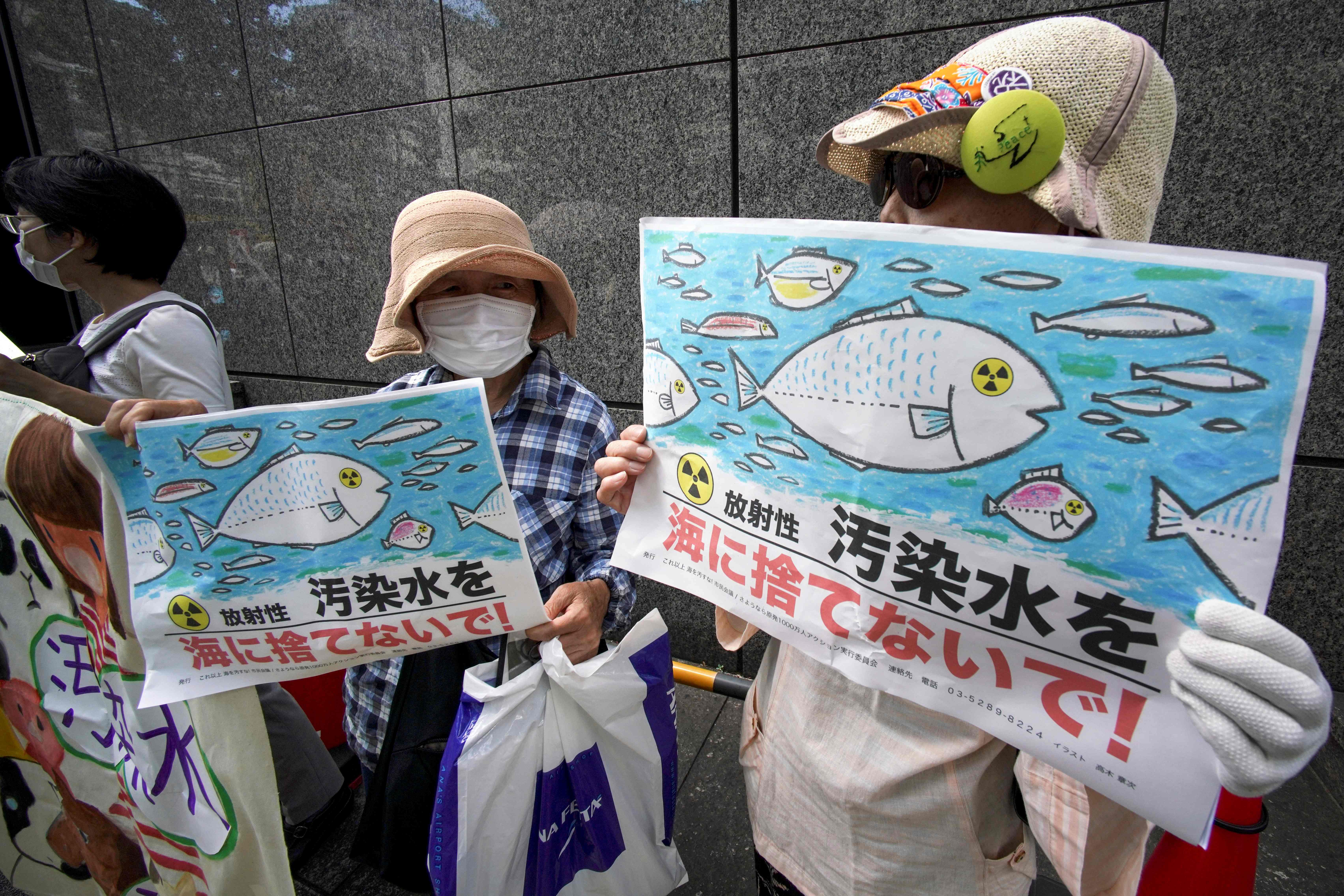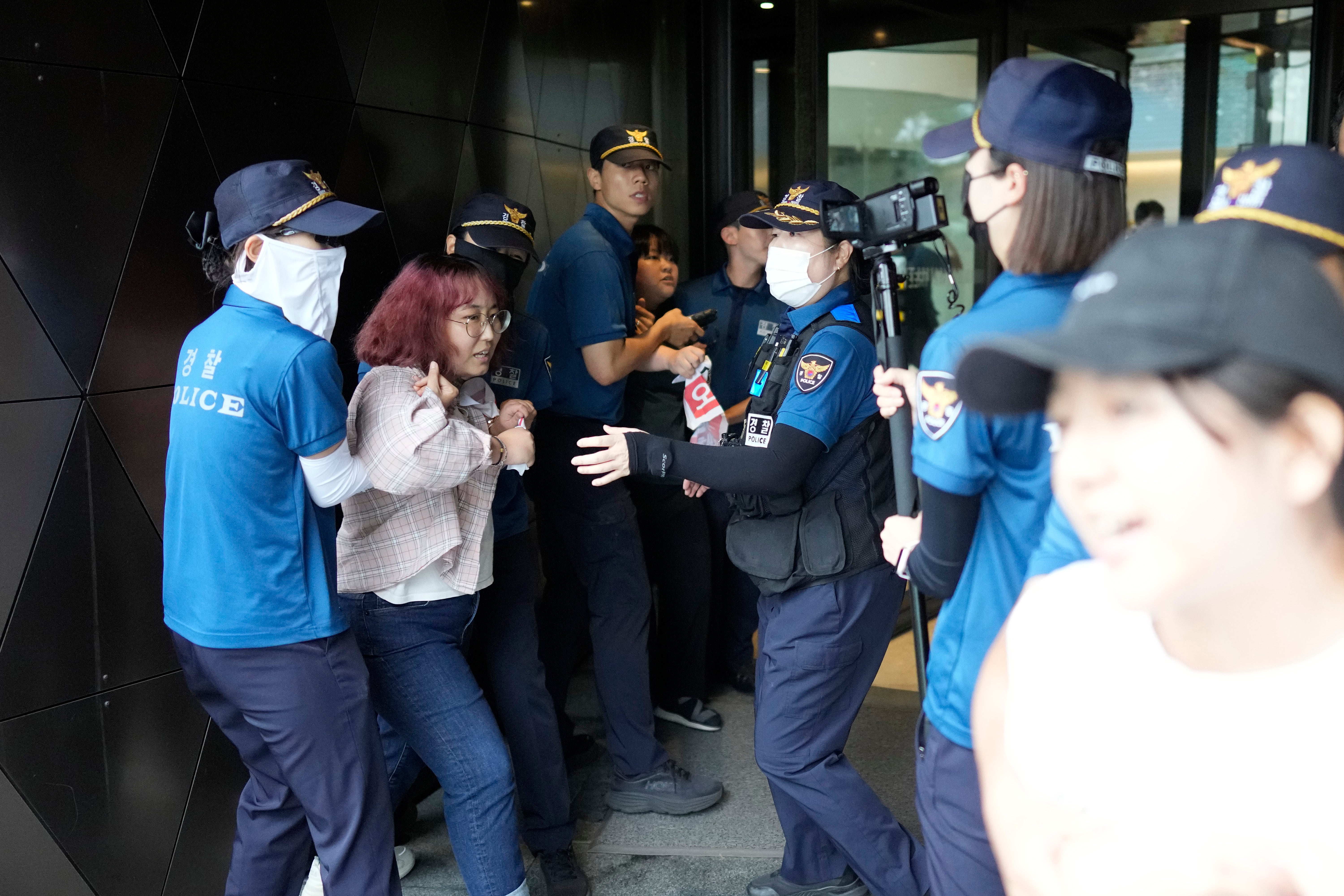South Korea arrests embassy protesters as Japan releases Fukushima nuclear wastewater
China bans Japanese seafood after one million metric tonnes of radioactive water are released

Your support helps us to tell the story
From reproductive rights to climate change to Big Tech, The Independent is on the ground when the story is developing. Whether it's investigating the financials of Elon Musk's pro-Trump PAC or producing our latest documentary, 'The A Word', which shines a light on the American women fighting for reproductive rights, we know how important it is to parse out the facts from the messaging.
At such a critical moment in US history, we need reporters on the ground. Your donation allows us to keep sending journalists to speak to both sides of the story.
The Independent is trusted by Americans across the entire political spectrum. And unlike many other quality news outlets, we choose not to lock Americans out of our reporting and analysis with paywalls. We believe quality journalism should be available to everyone, paid for by those who can afford it.
Your support makes all the difference.At least 16 people have been arrested amid protests in South Korea against the release of radioactive wastewater from the Fukushima nuclear facility in Japan.
Japan began the release of a million metric tonnes of treated radioactive water on Thursday, a major step towards decommissioning the facility which suffered a triple meltdown due to the 2011 tsunami.
Dozens gathered outside the Japanese embassy in Seoul to express outrage at the release of the wastewater into the Pacific Ocean, with those arrested accused of attempting to enter an embassy building.
The Chinese government has expressed strong opposition to the plan to release the water and on Thursday announced a new ban on seafood imports from Japan in response.
The move was aimed at preventing “the risk of radioactive contamination of food safety caused by Japan’s Fukushima nuclear-contaminated water discharge”, and to protect the health of Chinese consumers, the Chinese customs department said in a statement on Thursday.
China’s foreign ministry firmly opposed the plan on Thursday and said that the disposal of the contaminated water in Fukushima “is a major nuclear safety issue with cross border implications” and added that it was “by no means a private matter for Japan alone”.
Tokyo Electric Power Company Holdings (Tepco), the plant operator, commenced the water release at 1.03pm local time. Local media said that the initial release operations proceeded without any reported anomalies.

Over the next 17 days or so, Tepco will release about 7,800 tonnes of treated water into the ocean.
The Japanese government has maintained that the measure is necessary for the extensive work spanning decades aimed at decommissioning the facility.
Despite assurances by Japan and the approval of a two-year International Atomic Energy Agency (IAEA) investigation which deemed the water safe to release, some neighbouring countries have expressed scepticism over the plan, with Beijing emerging as the biggest critic.
The chief executive of Hong Kong, John Lee, said the release was “irresponsible” and posed “impossible risks to food safety and the irreparable pollution and destruction of the marine environment”.
On Wednesday, Beijing summoned the Japanese ambassador over the discharge of water.
“Vice foreign minister Sun Weidong summoned Japan’s ambassador to China, Hideo Tarumi, to make solemn representations regarding the Japanese government’s announcement that it would initiate the discharge of Fukushima’s nuclear-contaminated water into the sea,” a foreign ministry statement said on Wednesday.
Despite sweltering heat, hundreds of Japanese citizens from various regions of the country gathered in front of the Tepco headquarters in central Tokyo on Thursday morning, China’s Xinhua reported. The protesters urged the authorities to stop the ocean release.

The water has undergone treatment using the Advanced Liquid Processing System (ALPS), a method designed to eliminate radioactive elements except for tritium.
In the upcoming month, Tepco will conduct daily measurements of tritium levels near the water-release outlet about a kilometre off the coast.
“In addition to those who will actually handle the operations, we are preparing to release information without delay,” Junichi Matsumoto, the Tepco official in charge of the water-discharge project, said at a news conference before the process started, Asahi Shimbun reported.
“We would like to proceed with a great sense of urgency,” he added.
Earlier, the Japanese government upheld the neutrality of the final report from the United Nations nuclear agency, which maintained that Japan’s water-release plan adhered to international safety norms.

Japanese authorities also refuted claims that the country exerted pressure on the IAEA to release solely positive findings, denying any allegations of bias.
On Thursday, however, Greenpeace said that the radiological risks have not been fully assessed and that the biological impacts of tritium, carbon-14, strontium-90 and iodine-129 – to be released with the water – “have been ignored”.
The process of water disposal is a lengthy endeavour that will span decades, involving continuous filtration and dilution, in addition to the planned decommissioning of the plant.
Tepco said that the process of the wastewater discharge will be halted in the event of natural disasters or abnormalities.
Meanwhile, fishing communities in Fukushima have expressed opposition to the plan as well. In fact, polls have revealed that these concerns are widely shared among the general populace.

Masanobu Sakamoto, the leader of the National Federation of Fisheries Cooperative Associations, stated on Monday that while the group understands the potential scientific safety of the release, they remain concerned about the potential harm to their reputation.
In a recent Kyodo poll conducted over the weekend, 88.1 per cent of respondents expressed anxiety about the potential economic repercussions arising from the release. China and Hong Kong have already tightened their restrictions on imports.
South Korea on Wednesday stepped up protests against Japan, calling Tokyo’s plan to discharge water from the Fukushima plant an act of “terror”.
“We intend to hold the Yoon government responsible for failing to do its duties,” opposition Democratic Party leader Lee Jae-myung said at a party meeting.
Additional reporting by agencies



Join our commenting forum
Join thought-provoking conversations, follow other Independent readers and see their replies
Comments